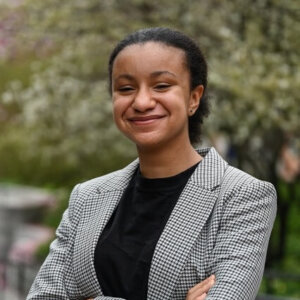Is Netflix’s new show the most Jewish cartoon ever?
Nearly every episode in ‘Long Story Short,’ from the creator of ‘BoJack Horseman,’ revolves around a very Jewish moment
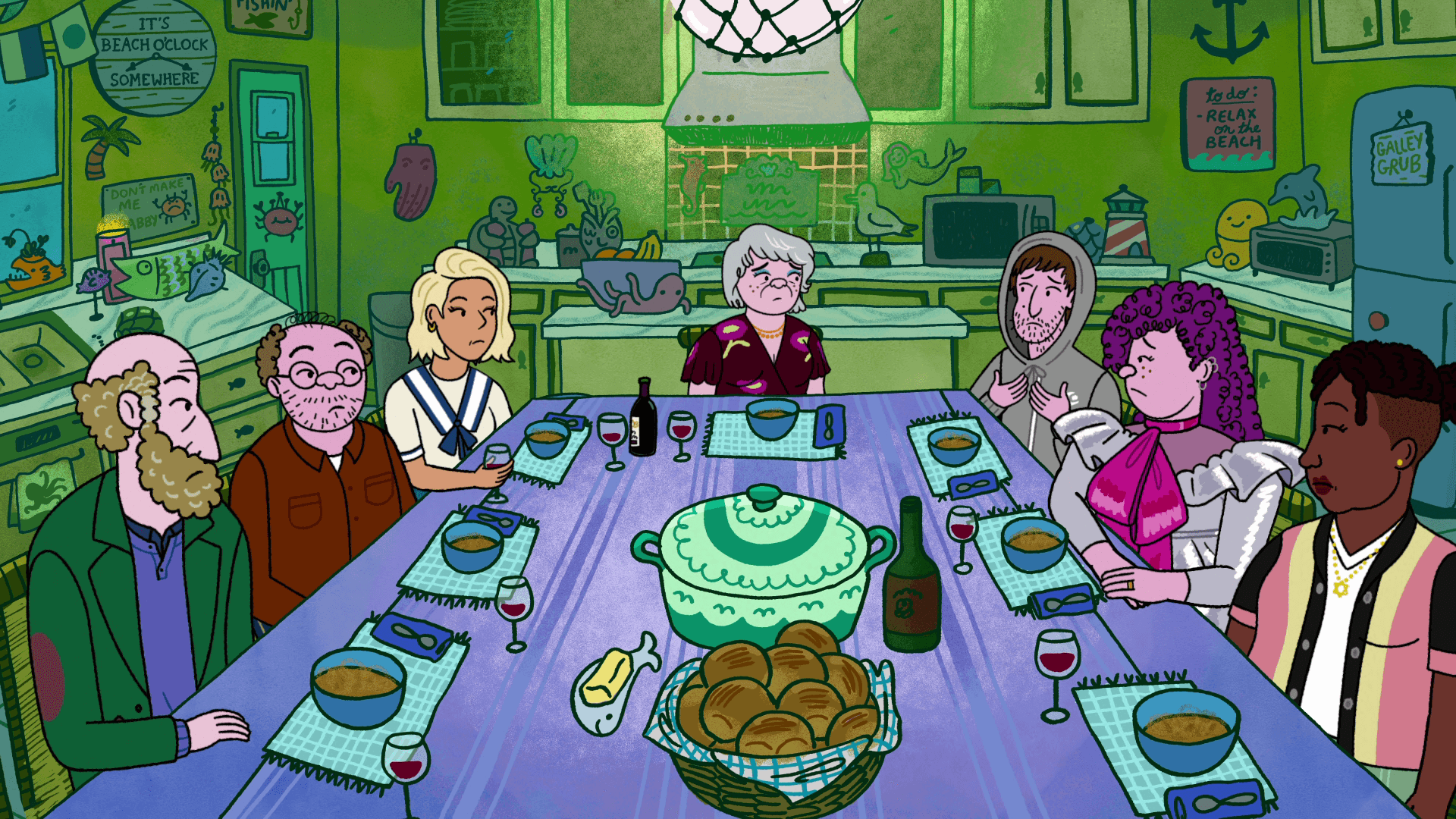
The Schwooper family — including everyone’s spouses — over a tense dinner. Photo by Netflix
The following contains light spoilers for the Netflix show Long Story Short.
The Schwooper family, the central figures in the new animated Netflix series Long Story Short, are diverse and unique — religious and atheist, gay and straight, farmers and businesswomen. Simultaneously, they are basically like every Jewish family you’ve ever met.
Naomi (Lisa Edelstein), the family’s domineering matriarch, is constantly nagging her kids to do better — her youngest son Yoshi (Max Greenfield) should be more professional; Shira (Abbi Jacobson), the middle child, should wear more dresses; her oldest, Avi (Ben Feldman) should be more observant. Her kids are constantly rolling their eyes and responding with sarcastic jabs. You’ve certainly seen this family. Maybe you’ve lived it.
The show, from animated hit BoJack Horseman’s creator Raphael Bob-Waksberg, isn’t linear; it jumps across the decades to show us snapshots of the young Schwoopers circa day school as well as their own parenting during the COVID pandemic and its aftermath. (Season 1 ends in 2022.)
Though the Schwoopers face crises that could befall any family — like Yoshi signing up for a multi-level marketing scheme involving spring-loaded mattresses — many of the show’s plotlines grapple deeply with Jewish identity.
Avi wonders if being Jewish simply means staying insular, eating fish that looks like a brain and being constantly afraid; Yoshi has a bar mitzvah crisis, struggling with what the rite means if you don’t believe in God; Shira is desperate to get her kids into day school, and is convinced it is only through making her mother’s knishes that she can win the administration’s approval.
The show takes a thoughtful, specific approach to Jewishness. But it also feels no pressure to explain itself, leaving plenty of Jewish moments that might not land, or even make sense, if they don’t reflect your experience.
Which left the Forward’s culture team with a lot to chew on. Who is Long Story Short for, and what is it saying? Read on for our discussion.
Jewish representation and Jewish clichés
Mira: I really liked that this show was not heavy-handed with its depictions of actual Jewish practice and identity. And I loved that we had a lot of really realistic different depictions. We have the oldest brother, Avi, who has sort of rejected Judaism, and resents it; he married a non-Jew and isn’t raising his daughter Jewish. Then there’s Shira, the middle child, who is gay — but even though her family looks different, she has pretty much stayed true to the Conservative Judaism she was raised with, and is sending her kids to Jewish day school. And then there’s Yoshi, the youngest, who ends up forging a totally different Judaism from his family, after a winding and experimental journey. I know lots of Yoshis and Avis and at least a few Shiras.
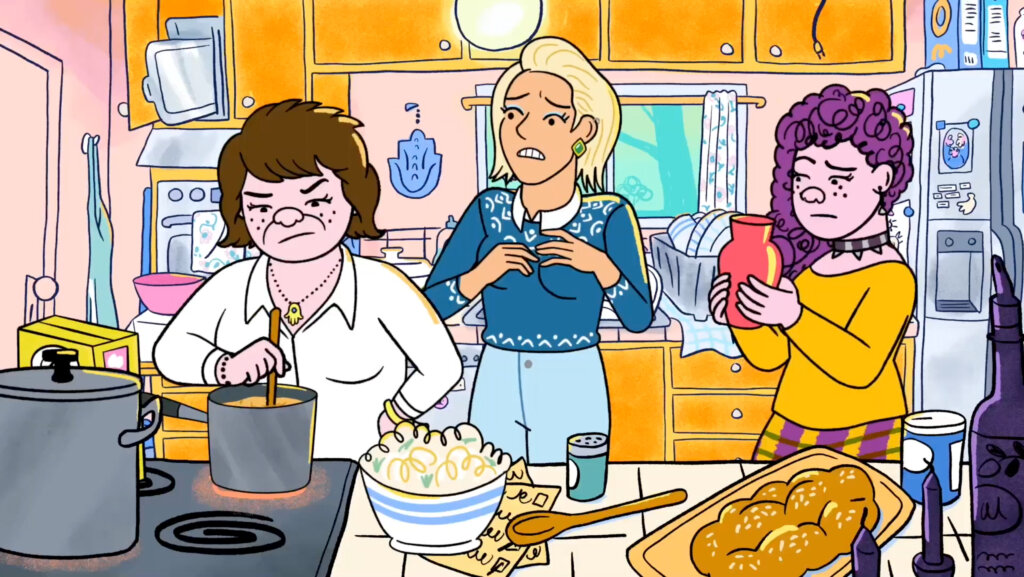
That being said, some characters’ sort of Jewy affect did rankle me a little. My mom and particularly my maternal grandmother absolutely do fit the show’s depiction of an overbearing Jewish mom. But as accurate as that feels to me, it also feels a little overdone; haven’t we told the jokes about the nagging Jewish mother enough times? It felt like a little bit of a cop-out because it’s such a trope. It’s an easy way to make a show feel really Jewish, but not an interesting one.
Nora: At first, I felt like the show was building up to be a deeper revelation about who Naomi was. There’s a really moving moment in an episode that flashes back to when she was a kid, and she cuts herself with a brooch to get her chaotic family’s attention. I thought, OK, we’re finally getting into it, this will be the episode where we learn who Naomi is. But it didn’t get explored.
Similarly, with Avi, I wanted to know what the roots of his Jewish disaffection were. He just comes off as a grump that Shira makes fun of for being a self-hating Jew. There were moments where I thought we’d get a deeper character study, and it didn’t fulfill that promise.
PJ: I think part of what it’s trying to do, with this fractured storytelling, is reflect the flow of when you’re with family and you’re remembering things. The conversation is discursive, it goes back and forth in time. We don’t talk about these things in a linear way.
The show feels like a blank check for Raphael Bob-Waksberg to make whatever he wanted after this huge success with BoJack Horseman, which was a weird and funky show, basically about Scott Baio as a horse (and a Democrat). What is interesting about Long Story Short was that it is living in this real place of specificity and isn’t afraid to do that.
Based on my conversation with Bob-Waksberg, he didn’t want to be boxed in. So it’s a Jewish show that’s not about antisemitism. And it doesn’t want to touch Israel because it’s just not interested in that. These people have rich Jewish lives and through these three siblings we have this dialectic with different ways to engage with being Jewish. I found it refreshing.
On the show’s approach to diversity
PJ: I want to talk more about the Nicole Byer character, Shira’s wife, Kendra. When we first meet her, it is clear she’s Jewish. And I think we were all hoping that it wouldn’t be explained, because why would we have to; Black Jews exist. But then it’s revealed that she’s a convert, and we have this moment with her in the Vidui prayer on Yom Kippur. And the story we’re given about how she ends up finding Judaism feels a little contrived.
Olivia: That’s something I thought a lot about. Black Jews are still treated as an anomaly, as something that needs explaining. When they meet at the grocery store while shopping for Rosh Hashanah dinner, the show seems to make fun of Shira for being so presumptuous when she tells Kendra that it’s nice she got invited to a Rosh Hashanah dinner. Kendra asks, “Why are you assuming, how do you know I’m not hosting?”
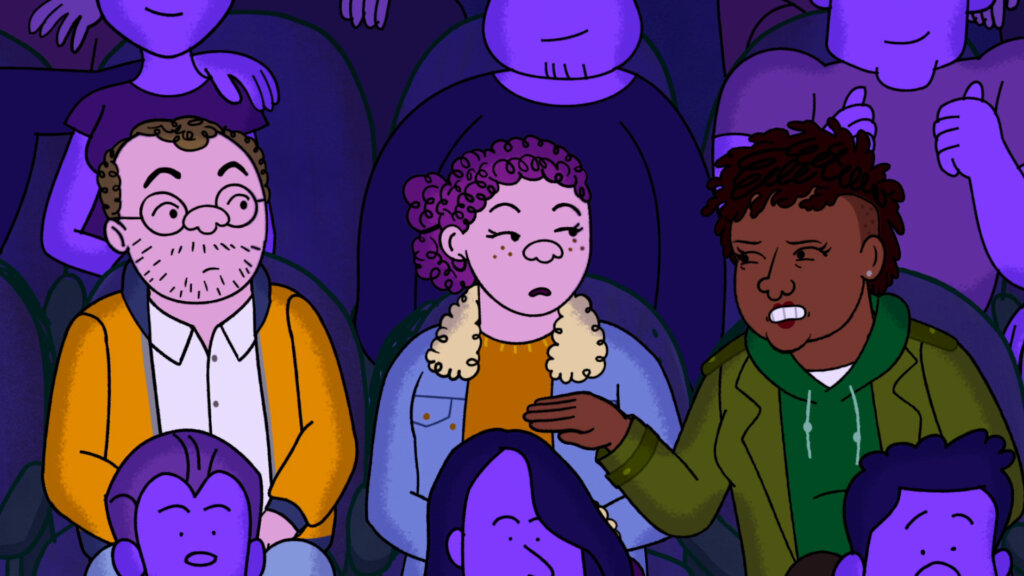
But then in the next episode, it sort of seems like she was right to assume that. We find out that Kendra became interested in Judaism as a way to explain a sudden absence from work without getting in trouble. It was very Black Cindy from Orange is the New Black — she’s converting to get something out of it. They turn it into a genuine moment, but why did she need to be swindling her way out of something?
I also think the show oversimplified how accepting Naomi would be of a Black daughter-in-law. She can’t stand Avi’s “shiksa” girlfriend, but Kendra is perfect? From what I know about interracial relationships, I wouldn’t say that is likely.
Mira: I think the smoothing of how diversity is received in general was interesting. Not just with Kendra’s conversion moment, but also with her and Shira being queer. It’s not really touched on if that would be an issue for them at all in the synagogue or day school or with any of the family, and I think it almost certainly would be, at some point.
The audience for the show
Mira: I wonder what the sell for this show is. I know that I am overwhelmed every time I open a streaming app by the sheer volume of new shows I’ve never heard of. And if there’s not some big monocultural show like Succession that everyone is watching, or nothing that I go in searching for, I have trouble choosing. While “cartoon about Jewish family” obviously will appeal to a certain set of Jewish families, who else is going to watch that? I’m sure some BoJack fans will watch, of course, but I wonder if they will stay.
Nora: What is Raphael Bob-Waksberg saying about Judaism? We think he got a blank check to make this show, and he does present this diversity of American Judaism. But I’m still curious about which parts he chooses to tease out more and which he doesn’t and why.
Olivia: It feels like the show is really for Jews. I really couldn’t imagine non-Jews watching this. I was thinking it will be a word-of-mouth show, like they read about it in the Forward or hear about it from their kids.
I think there’s things you just can’t understand if they’re not explained to you. Like when Naomi explains their observance level.
PJ: The way Naomi describes their practice is “progressive, Conservative, ritual over faith and blind practice. That’s literally the only way it makes sense.”
Olivia: That makes perfect sense to me because it’s like my grandparents. My grandmother would cook bacon, and they didn’t believe in God, but it was super important to them that their grandkids were raised Jewish in a synagogue. But when my mom stopped eating shellfish and pork, her parents never knew because they’d make fun of her — that’s too observant. Even though they were huge members of their congregation.
That said, I did think that some of the references that would have been inside jokes will make sense because of how much Jewish organizations have been in the news, like a bit about a bar mitzvah check that’s a donation to the ADL.
Mira: I agree that a lot of stuff is going to fly over some non-Jews’ heads, or even some Jews’ heads. But I also think that is what makes this show good, and not annoying or didactic. I’ve written so many reviews of Hallmark Hanukkah movies complaining about how they feel the need to put in these awkward, forced explanations. A character will say something like: “Hey, do you want to come spin the dreidel? It’s my favorite traditional Hanukkah game! Gee, I just love those chocolate gelt coins.”
If I don’t want a show to explain every little Jewish thing, I think it looks like Long Story Short. Maybe not everyone gets every joke. But that means it is going to be a richer text for Jews. Even in places where I maybe wanted more development, I didn’t need it. I know so many people who have, for example, converted or are in an interfaith relationship, so I have a depth of references that I extrapolate from to enhance or enrich my understanding of the characters.
What does the show say to Jews?
PJ: I think that it’s not meant to be prescriptive or say anything definitive. When I spoke to him, he said he had a lot of ideas and he didn’t feel the need to decide anything. He could just let the characters talk through things. Which I think is not a cop-out, actually, it’s a very Jewish approach.
Nora: It’s refreshing that it’s not about what it’s like to be a Jew after Oct. 7. It’s not that it doesn’t deal with deep themes, but it’s just a family of Jews existing, and we don’t need to explain anything about it. They deal with maybe internalized antisemitism, or grief, or wrestling with how they want to be Jewish in the world. But it’s not so angsty.
Mira: Because Abbi Jacobson from Broad City plays Shira, I was thinking a lot about Broad City while I watched, and where Long Story Short fits into the canon of Jewish media.
I felt like Broad City offered a new model of Judaism for our generation, where some of these old tropes about nagging Jewish mothers or Jewish American Princesses or Jewish guilt were present, but the characters didn’t feel weighed down by them. The show offered this very empowered version of Jewish femininity that wasn’t about competing against shiksas or being scolds. Abbi and Ilana got to be fun and irreverent in their Jewishness, like when they made a huge deal about fasting for Yom Kippur and then broke it with bacon, egg and cheese sandwiches and didn’t feel bad about it at all.
I think Long Story Short is very much about the younger generation trying to figure out their relationship with Judaism, but it doesn’t offer as clear of an idea of how they do so as Broad City did. But it’s clear that all the children feel some need to reinvent their Jewishness.
Olivia: Crazy Ex-Girlfriend is one of the shows that comes to mind for me, and the mother in that has so few redeeming qualities. There’s that whole song, “Remember How We Suffered,” that’s talking about how the only thing Jews do is talk about the Holocaust. There’s really no representation of Judaism outside of it being a chore. And Broad City was refreshing in that way — the mother in it was a stereotype, but she and her daughter have a great relationship.
I think Long Story Short was refreshing in the sense that Judaism isn’t only a burden, there’s a value and a richness to it.
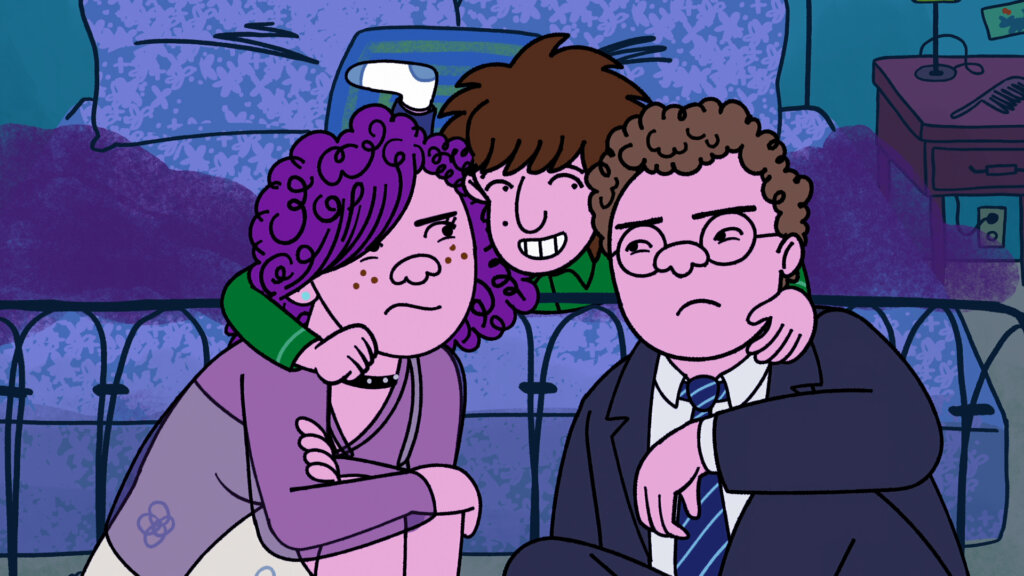
PJ: I think this show is continuing in a longer tradition, maybe starting with Philip Roth and Portnoy’s Complaint, of Jews writing without their own institutional PR in mind. Not to make us look noble or good, but to present us as openly flawed. That continues on through the Coen brothers and A Serious Man, where it’s incredibly Jewish but not particularly flattering. Now we’re at this point where we don’t have to care so much about making a political statement or to dig so hard to critique our own community. It’s more tender, it’s coming from less of an angry place, but it still feels part of that tradition. We can approach with love but with an awareness that some stereotypes exist for a reason.
Like there’s this shyster-y lawyer character, the uncle, played by Danny Burstein. We go back and we see the family has a running joke about him. It is acknowledging that this uncle guy is a type of person who exists, but it’s also the type of person we make fun of — they’re a source of humor. We’re all in on the joke.
Nora: I kept thinking about the show Transparent; I think it is just sort of nice to see a family with a lot of tenderness going through these evolutions and challenges without having to justify it. It doesn’t shy away from stereotypes, but lovingly engages with them.
I also really appreciated the way it was talking about what it’s like to be marginalized as a Jew in America without it being didactic or political. I’m thinking of the episode where they go to school for a Christmas show, and the songs — one of them has the lyrics “Hanukkah, Ramadan, Kwanzaa too — we tolerate them all, but there’s nothing like Christmas!” That is exactly what it’s like to be a Jew in America at Christmas, where everyone is goading you to just participate because everyone loves Christmas. It’s just such a specific experience that I’d never seen represented.
Mira: Long Story Short might not give a lot of factual information about what it means to keep kosher or anything like that, but I think it does a good job at presenting Jews of all levels of observance as normal people who are also a relatable American family.
What do we want to see in the second season?
Mira: I’d love to see Shira’s coming out, and the first time she brought Kendra home, to know how her family came around to loving her wife so easily. I also want to see more of Yoshi’s Jewish journey, which is clearly winding; I feel like he definitely took a Buddhism pit stop at some point, maybe while he worked on the goat farm and smoked a lot of weed.
And I think I want to see the grandparents’ generation, and with it, more about how Naomi and Elliot — but particularly Naomi — grew up. I want to see a bit more of her tenderness; we get glimpses, but that’s it.
Nora: I want to see how Naomi and Elliot met. I also would love a bris episode for Shira’s kids, Walter and Benjamin — I think that would be hilarious. I also want to know what happened with Avi and his ex-wife’s marriage; I have the impression it has something to do with his relationship with Judaism.
Olivia: There’s a scene in the opening episode where Avi makes a joke in the car and it relieves some tension and he and Naomi make eye contact in the rearview mirror and smile. It shows they have this deep, sweet, special relationship that kind of falls apart by the time he’s an adult. I want to know more about him.
I’d be curious to know more about Kendra’s family; we get a bit of them in that one episode on her conversion, but I’d love to see where her family is now after she has converted. I’d like to know more about ָָAvi’s teenage daughter and how she sees her family. And maybe more about their lives outside the family, like with friends — I have no idea what Shira does for work.
PJ: I imagine Shira is an academic who wrote her dissertation on Walter Benjamin, and that’s why her two kids are named Walter and Benjamin.


